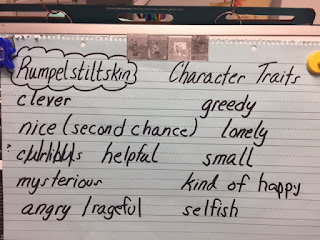This is one of a series of blog posts that continue the conversation around Still Learning to Read--teaching reading to students in grades 3-6. This series will run on the blog on Tuesdays starting in August 2016 and continue through the school year.
We have been doing lots of reading across several texts--thinking about similarities and differences, adding onto what we understand and more. Last week I shared some work we did with books about Wangari Maathai. This week, we read several versions of the classic tale Rumpelstiltskin. I want kids to understand connections between books in a much deeper way than they have in the past so I am varying the ways kids might connect one book to another in order to build understanding.
For this read aloud, I wanted kids to have access to all of the preview pages and I wanted to be able to look at all of their annotations for the book so we all created read aloud notebooks out of construction paper and blank pages for this book. As we previewed kids added cover, back cover, table of contents and the first page of text into their booklets.
I had stapled the books together beforehand and had included the photo of the Rumpelstiltskin books we'd read on the first page. After looking at the cover and the title (Rump, The True Story of Rumpelstiltskin), I asked kids to think about what they knew from the 4 books we read and what they would EXPECT in this book. They were very thoughtful and very thorough.
This is similar to what I shared in the new edition of Still Learning to Read but every year is different and the goals for this read aloud are a bit different this year as it is a different set of kids, different time of year, etc. This is a perfect example of why I can't plan to hit the same things that I did last year. For example, last year when we talked about traits after reading 4 versions of Rumpelstiltskin, 3rd graders had very different (and not such kind) things to say about the character. But this year, my readers seem to have seen some good deep down in Rumpelstiltskin. When we talked about all that we knew, someone mentioned that he was helpful as he came in to help the queen. One said he was lonely because he sang by himself and wanted that baby to keep him company. They thought he was kind because even though the queen promised her baby, he gave her a second change. Last year, we were able to talk about how our thinking about Rumpelstiltskin changes as we heard his perspective and the traits we saw in him were different. We'll still have that conversation but we are at a different starting point so that will be different learning.
This is a challenging book for this time in 3rd grade but it pulls together so many skills we've been working on. The talk and thinking we are doing around this read aloud builds on all that we've done all year. Reading across text, using what we know, previewing, thinking about the character, and point of view will all be part of our conversation. This group has picked upon the importance of the word "destiny" already so that may be more of our conversation than it has been other years.
I am looking forward to our conversations around this book!









I think read aloud is a good strategy for the modeling of fluency. Struggling readers must hear what fluency actually sounds like . The use of technology with read aloud is definitely a bonus. We are living in a new era and our children learn from interaction . They enjoy hands on activities,which is why technological aids appeals to them . They will be eager to learn as they listen for prosody and accuracy during the model readings.
ReplyDelete